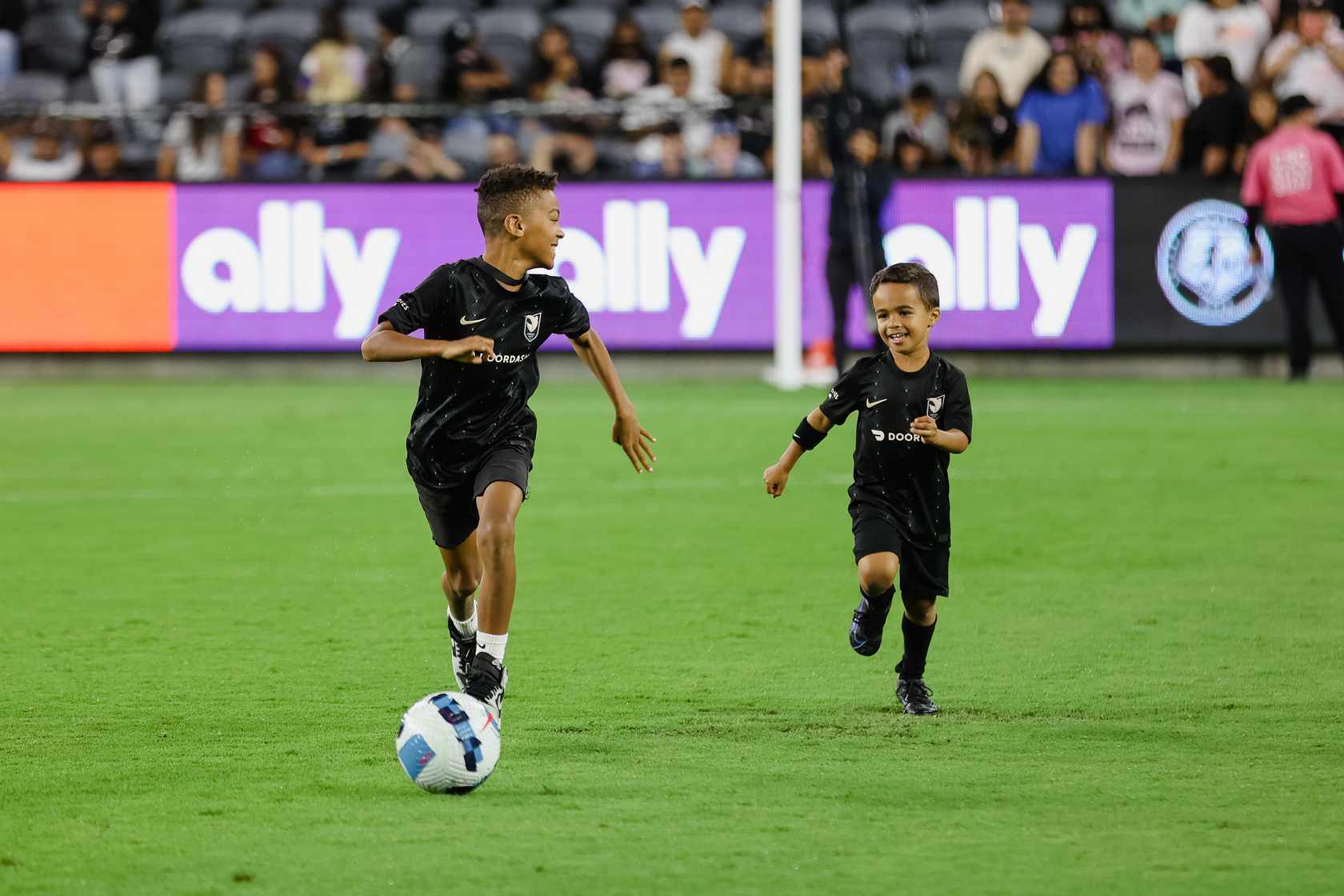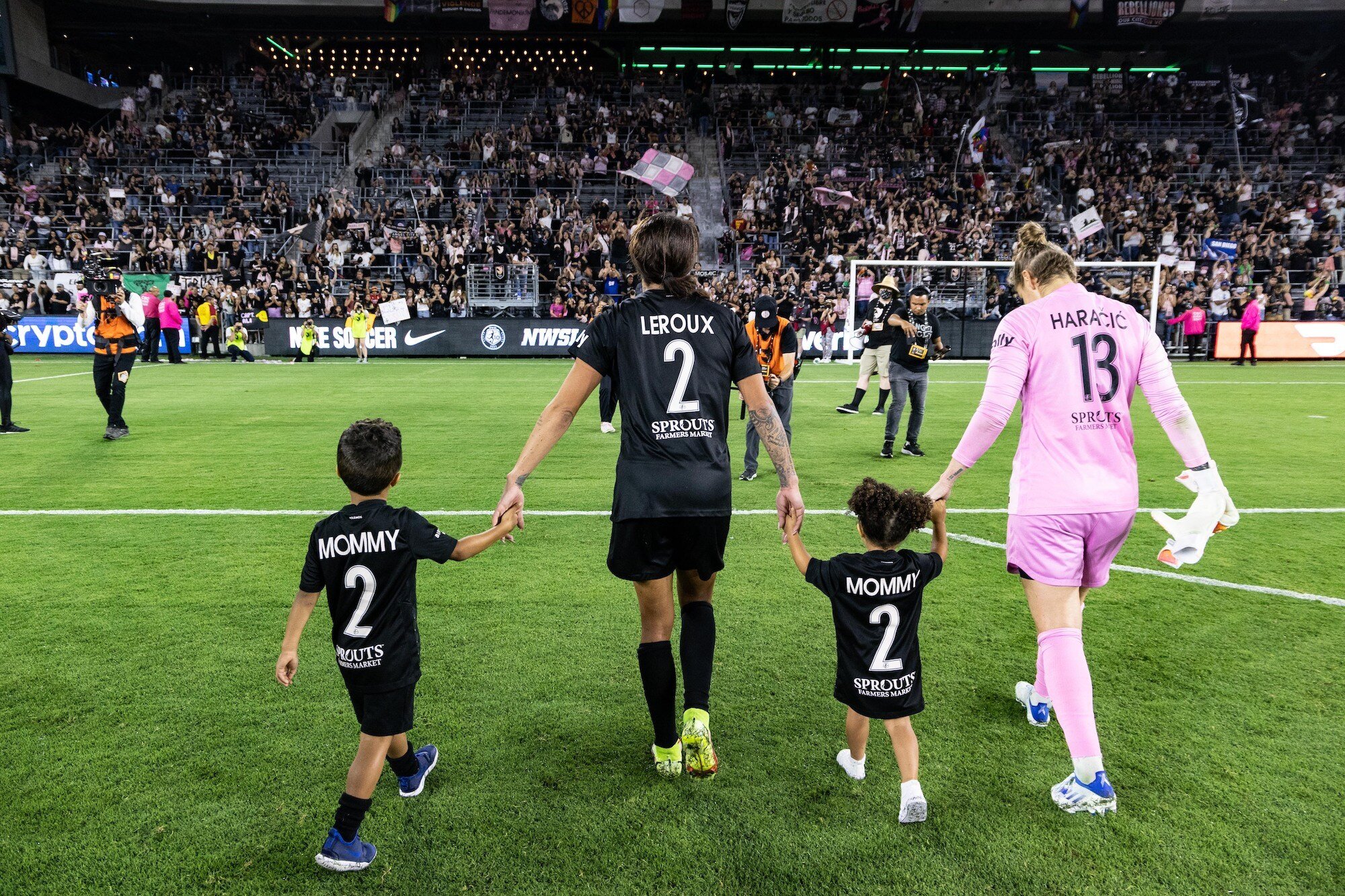.png?width=520&height=294&name=IMG_2277%20(1).png)

Three Angel City players—Sarah Gorden, Sydney Leroux, and Julie Ertz—are moms, and Gorden and Leroux have both been raising their kids while playing professional soccer for multiple years. Leroux has a six-year-old son, Cassius, and a three-year-old daughter, Roux; Gorden's son, Caiden, is nine.
AngelCity.com spoke with Gorden and Leroux about their experience raising boys, in particular, around NWSL teams, and about how that upbringing has influenced their sons.
Katelyn Best: You guys are both moms, and you’re both raising boys. Your kids are growing up in a really unique environment where they’re surrounded by all these powerful women, who also happen to be professional athletes. What impact do you think that’s had on them?
Sarah Gorden: I would say that something I've noticed with Caiden growing up around the sport—and we talk about this—he's very sweet, he's very sensitive, and he has just this level of admiration or respect for women that I think we can attribute to him always being in the locker room, being around the women, and just seeing such strong, incredible women in his life from the time that he was a kid. His favorite soccer players are female soccer players—he doesn't name males. So I think he's always going to be someone that respects women and fights for women.
KB: Other than you, who are his favorite players?
SG: He had this run where he really liked Lindsey Horan, but I think he still loves [Christen] Press.
KB: What are your thoughts, Syd?
Sydney Leroux: Like Sarah said, we do talk about this. We have this fight going on with equality and what the men's game looks like versus ours and everything, and I think that's why we're starting from such a young age [with our kids]. They have always had the most respect for us and they see how hard we work, and I think that's no different to them. That's been probably the coolest thing. I think also, as a mother raising boys, you want to basically teach them to be a good human being at the end of the day, and I think being able to come and be around all of these strong women is amazing.
KB: even setting aside the gender piece, what’s the impact for your kids of having so many positive adult role models, period?
SG: Shout out to our teammates, because it really takes a village to be a mom. I remember being a rookie and feeling like, I don't want to upset anyone with having my two-year-old run around, but from here to Chicago, my teammates have always embraced Caiden with open arms—and Cassius. It's really beautiful to see that love they have for each other. It takes a village.
I was thinking about this the other day. As female athlete moms, our kids are always, especially when they're younger, here in our space with our teammates. But I've always wondered and I have assumed maybe I'm wrong, but like male athletes that are dads, their kids don't get to grow up in the same environment.
SL: They're not traveling with them, right? They’re with their mom at home. It's a very different life and I am really happy to be able to do that. But I also think that, like, if we ask for the same, like it should be happening more in women's sports as well because that gives them more of an opportunity to be as present as we have to be all the time.
KB: Are there any teammates your kids have gotten particularly close with?
SL: Like Sarah said, it does take a village. It can be someone different every other day. They [all] have been so amazing. When Cassius was a baby, I brought him everywhere. That’s normal for us, which it’s not for [other parents]. Everyone's just been super helpful. We've come a very, very long way in how we started and we're obviously very happy, but it was a little bit of a struggle, for sure, to be a mom [in the earlier days of the league].
SG: That's a whole other conversation! But yeah, I think something that's cool is how sometimes they’ll form relationships with someone on the team that you're not as close with. It’s cool that they feel so comfortable and everyone is so welcoming. Sometimes Caiden will tell me about one of my teammates, like, where they're from, and I'm like, “Oh, I didn't know that! That's really cool that you vibe with them like that.”
KB: Sarah, you mentioned earlier that Caiden really respects and admires women. Can you talk about what you mean by that? How do you see that in the way he acts?
SG: You know when you go on ESPN and they post about women's sports and you see like, hundreds of comments of men just being like, “this sucks, what is this?”
SL: “Get back in the kitchen!”
SG: Yes, like crazy comments! Our boys, they are never going to be like that. They watch us play soccer and they think we're the hardest working, most amazing people, and they don't see male or female. They just see us for what we are and what we give and how hard we work. I think that just seeing Caiden at school, he has a lot of friends who are girls, and it's because he's so comfortable talking to girls. It's not a big deal. He's used to it.
SL: They just have respect for women. You’ll see, like, the ESPN stuff that happens, and you think, “Would you talk to your mother that way?”
SG: Exactly. Or your daughter?
SL: You go on their page and it’ll be like, “girl dad!” Like, I hope you don't talk to your daughter the way you talk to us! I hope you truly don't feel that.
But where did they learn that? It’s not in an environment like this. That's never going to happen with our boys, and I'm really proud of that.
KB: When I was a kid, I had a lot of male friends because I had a lot of “boy” interests, and I remember feeling like I had to prove I could do everything as well as them. Can you relate to that, and do you see that dynamic with kids today?
SL: Yeah. I wanted to show [the boys] that I was better.
SG: Yeah, same. The neighborhood boys would play hockey on rollerblades and I was younger and I was like, “I'm the goalie, bro.”
SL: I also feel like you had to turn into them to feel like you were the same, right? Now, I don't think you have to do that. I think you're free to be yourself, which is really nice. So in that sense, I do think we're moving forward.
SG: I agree.
KB: And I think the kids being able to see, even fans that come to Angel City games, being able to see—
SL: “I relate to this person.”
KB: And gender doesn't matter.
SL: Yeah, 100%.
KB: For decades in women’s soccer, all the messaging was about inspiring little girls, which I think is a flawed message in a lot of ways. Now, I think we’re starting to move past that, and lots of boys look up to you guys, too.
SL: Yeah. You look at an Angel City game, there's little boys with our jerseys on that aren't our kids, which I think is amazing because that didn't happen before. I think especially here, you see that a lot.
KB: Last question: do you have any memories of moments your teammates have connected with your kids, or ways they’ve supported you as parents?
SG: I have a bad memory! It was my rookie year in Chicago and Caiden was two and I brought him to practice. There’s no one at the time there to watch him. I think there was just a coach and an assistant. There was no one else. He was literally getting in the way of the drills, like, laying on the ground. I said to my coach, “I need to leave. I can't be at practice.” So I left. And then Press, who was my teammate at the time, texted me to say, “just want to make sure you got home safe and everything's good!”
It was one of my few first weeks on the team—and it's full circle because we're teammates now—but I think that just illustrates how difficult it was at the time dealing with that, but also how our teammates have always understood and been there and supported us.
SL: I've always had coaches who have understood my situation, too. don't they? They try their best. To be a mom, to be a working mom and to be a professional athlete mom, it's hard. There’s a mental and physical exhaustion we have. And so for me, I remember just like being on a plane and someone has my kid and I'm asleep, because I didn't sleep that night, because I was breastfeeding. When I came back [to soccer], they were babies! So having that help around me, I will always be so thankful and grateful that I had teams and people who were always willing to help.






